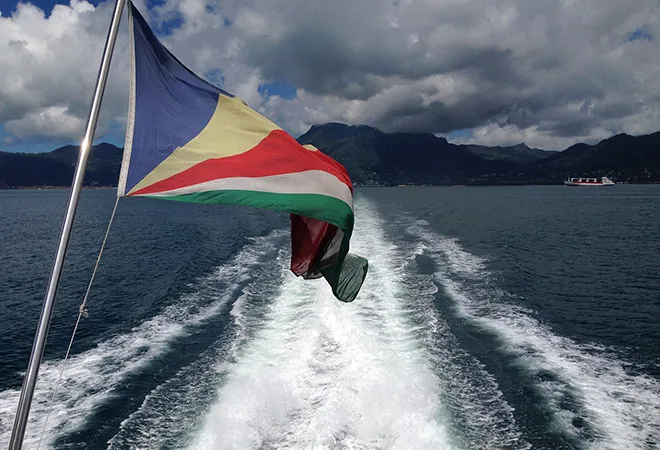
Back in 2015, India and Seychelles signed an agreement to jointly develop facilities on Assumption Island to be used by both countries. Assumption Island is situated some 1,100 km southwest of the Seychelles’ main island of Mahé. The proposed development was aimed at helping Seychelles’ Coast Guard to patrol the nation’s Exclusive Economic Zone (EEZ) against piracy, illegal fishing and drug-trafficking amongst others.
In June 2018, amidst domestic political opposition, President Danny Faure of Seychelles reportedly said at a press conference (ahead of his visit to India) that the project
will not move forward and
it would not be discussed on his visit. Once in India, it was reported that discussions did take place and that the two countries agreed they “
would work together bearing each other’s interests.” However, there has been no progress beyond these statements, giving weight to the Seychelles’ Leader of the Opposition, Wavel Ramkalawan’s statement that “
the agreement on Assumption is dead.”
What are the key takeaways for India that can be applied to understanding India’s relations with other Small Island Developing States?
Why did Assumption Island project cause a furore in Seychelles? What are the main concerns of the Seychelles government, opposition and Seychellois people? More importantly, what are the key takeaways for India that can be applied to understanding India’s relations with other Small Island Developing States (SIDS)?
Domestic politics
As leader of the opposition Linyon Demokratik Seselwa (LDS), Ramkalawan has been explicit about their unwillingness to ratify the agreement in parliament, reportedly stating “
that LDS has nothing more to do with the Assumption agreement.” After the 2016 elections, with 19 seats in the 33-member parliament, the four-party LDS coalition can refuse to ratify the India agreement. This is so despite President Faure’s promise of working together.
Ramkalawan’s statement is significant when placed within the context of new developments in the domestic politics of Seychelles. The 2016 victory of the LDS was historic as it was the first time that the opposition won the parliamentary election in nearly four decades. It is also in some sense predictive of the changing political climate in the country. It has been argued that the growing popularity of the coalition coincides with an increasing sense of public frustration about the high levels of inequality.
The 2016 victory of the Linyon Demokratik Seselwa was historic as it was the first time that the opposition won the parliamentary election in nearly four decades.
India needs to take note of these domestic developments and its potential implications for the future. Given that 2020 is an election year in Seychelles, neither the government nor the opposition will want to risk making a move that will cost them politically. Domestic structures and domestic politics are extremely crucial. India needs to pay close attention to these, not just in Seychelles but in all neighbouring SIDS.
Public opposition
Public opposition to the project must be noted. After the initial MoU was signed in 2015 a revised agreement was signed in January 2018. Since then an NGO called ‘Save the Aldabra Group’ held weekly rallies to register their concerns about the environmental impact of the project, mainly to do with the proximity of Assumption to Aldabra. Aldabra atoll is a UNESCO World Heritage Site and home to the world’s largest population of giant tortoises. Though small in number, neither the government nor the opposition can ignore them.
President Faure in an interview admitted that the environmental concerns were “
genuine.” In response to the protests, the government organised a public hearing.
Seychelles News Agency reported that a hundred citizens attended and that the public opposition to the project was overwhelming. While a town hall meeting of this size is not really represented of a population of 95,000, it is worth noting some of objections raised by the Seychellois people.
Sustainable development
In 2018 the government adopted the ‘Seychelles Blue Economy Strategic Framework & Roadmap.’ It is an integrated approach towards development that brings together economy, environment and society consistent with the Sustainable Development Agenda and the Paris Agreement. As India vies to play a bigger role in international organisations and for a lead in regional ones, it is important that it is seen as supporting Seychelles and other SIDS in achieving their Sustainable Development Goals (SDGs). This is particularly important when it comes to Seychelles which has shown great innovation through initiatives such as debt-for-nature swap and marine spatial planning.
As India vies to play a bigger role in international organisations and for a lead in regional ones, it is important that it is seen as supporting Seychelles and other SIDS in achieving their Sustainable Development Goals.
For SIDS, environmental concerns are extremely important and urgent. Public opinion in these countries see a threat to their ecosystem as equal to a threat to their maritime security. Unsustainable practises and projects have serious and long-term consequences, posing at times an almost existential threat. In these matters where public opposition is strong, New Delhi must be seen as taking them seriously. Where genuine concerns exist India must show a willingness to provide alternatives.
Influx of foreign workers
Public opinion against the project also highlighted local fears of a potential influx of Indian workers. This is not unique to SIDS. Infrastructure projects which often come with workers from outside the local community are deeply resented for this very reason. Chinese projects have suffered from a similar image problem, particularly in Africa, where they have struggled to shake off the negative perception that Chinese companies excessively rely on Chinese workers over the locals.
India needs to be careful about such perceptions. It needs to consider arrangements that will garner support from the local population. Although, unlike China, India has a policy of not ‘export labour,’ extra care needs to be taken in this matter. It further needs to pay attention to local apprehensions about infrastructure projects in its immediate and extended neighbourhood, whether regarding Hambantota port in Sri Lanka, Myitsone dam in Myanmar, Kunming–Kyaukpyu railway from China to Myanmar, Bhutan’s concerns with BBIN, or Assumption Island Project in Seychelles.
Although India has never referred to Assumption Island project as a military-base, once objections to it grew, a new narrative started to take hold. After documents allegedly relating to the project leaked online, concerns about sovereignty and foreign presence became vociferous. Clarifications by President Faure and Government of India (GoI) could not reverse the early damage caused. President Faure explained that the notion that India was about to set up a base was “
wrong communication.”
What was intended to be a joint operation in the interest and benefit of both countries has turned into a debate on sovereignty and India’s presence on the island being seen as a threat.
As the then Indian High Commissioner Ausaf Sayeed pointed out, Assumption first came up for discussion more than 10 years ago at a time when piracy was at its peak. Seychelles was looking to partner with other countries and put forward the proposal to have a joint coastal facility. When the project was finally announced in 2015, the opposition was very much in support of it.
Today, the narrative has become political. What was intended to be a joint operation in the interest and benefit of both countries has turned into a debate on sovereignty and India’s presence on the island being seen as a threat. For the opposition, supporting the agreement is no longer politically worthwhile. For President Faure, given the opposition’s majority in parliament, it is no longer politically viable.
Insidious narratives
India needs to acknowledge that narratives are important, and also insidious. Once they become established, they are difficult to get away from. India needs to closely follow negative perceptions about its efforts in the neighbourhood and address these in a more direct and timely manner.
In 2015, within a week of the agreement being signed, the Chief of Staff of the Seychelles People’s Defence Forces (SPDF), Lt. Col. Michael Rosette, clarified that “
there is no lease agreement” and that the Indian government would help Seychelles government through the SPDF. Lease agreements and loss of sovereignty to larger more dominant powers have become a real fear for SIDS. Given that India is itself concerned about such agreements being signed in its neighbourhood, it should have addressed this concern directly, explicitly and also at the very beginning.
Community impact projects that focus on immediate necessity are extremely significant. These projects, though small in size, will improve the actual lives of the Seychellois people.
As the narrative became marred in negative rhetoric, what was lost in all the noise was India’s willingness to take into account concerns over loss of sovereignty which resulted in a revised agreement. Worse still, as the debate on sovereignty took centre-stage, it took out of focus the multifaceted nature of India-Seychelles relations.
Defence cooperation and infrastructure development are only one aspect of the relationship. Several other areas are being explored such as civilian infrastructure, hydrography and twinning cities. Community impact projects that focus on immediate necessity are extremely significant. These projects, though small in size, will improve the actual lives of the Seychellois people. Social housing project that aims to build 3,000 houses, gifts of buses and ambulances are some of these in the pipeline.
No agreement is entirely dead, but domestic politics and public concerns will likely stall this project till it becomes politically and environmentally viable. Great power competition that is omnipresent in international relations adds further challenges. Much will depend on India’s willingness to further revise the agreement, patience to find alternatives and desire to allow greater transparency. As China is beginning to face some pushback on its infrastructure projects, New Delhi needs to pay closer attention to the reservations of its SIDS neighbours.
The views expressed above belong to the author(s). ORF research and analyses now available on Telegram! Click here to access our curated content — blogs, longforms and interviews.



 Back in 2015, India and Seychelles signed an agreement to jointly develop facilities on Assumption Island to be used by both countries. Assumption Island is situated some 1,100 km southwest of the Seychelles’ main island of Mahé. The proposed development was aimed at helping Seychelles’ Coast Guard to patrol the nation’s Exclusive Economic Zone (EEZ) against piracy, illegal fishing and drug-trafficking amongst others.
In June 2018, amidst domestic political opposition, President Danny Faure of Seychelles reportedly said at a press conference (ahead of his visit to India) that the project
Back in 2015, India and Seychelles signed an agreement to jointly develop facilities on Assumption Island to be used by both countries. Assumption Island is situated some 1,100 km southwest of the Seychelles’ main island of Mahé. The proposed development was aimed at helping Seychelles’ Coast Guard to patrol the nation’s Exclusive Economic Zone (EEZ) against piracy, illegal fishing and drug-trafficking amongst others.
In June 2018, amidst domestic political opposition, President Danny Faure of Seychelles reportedly said at a press conference (ahead of his visit to India) that the project  PREV
PREV


